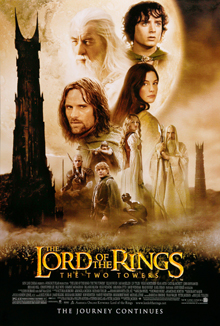
Back The Lord of the Rings: The Two Towers (rolprent) Afrikaans The Lord of the Rings: The Two Towers AN سيد الخواتم: البرجان Arabic سيد الخواتم: البرجان ARZ The Lord of the Rings: The Two Towers AST Üzüklərin hökmdarı: İki qala (film, 2002) Azerbaijani اوزوکلرین اربابی: ایکی قولله AZB Уладар пярсцёнкаў: Дзве вежы Byelorussian Властелинът на пръстените: Двете кули Bulgarian দ্য লর্ড অব দ্য রিংস: দ্য টু টাওয়ার্স Bengali/Bangla
| The Lord of the Rings: The Two Towers | |
|---|---|
 Theatrical release poster | |
| Directed by | Peter Jackson |
| Screenplay by |
|
| Based on | The Two Towers by J. R. R. Tolkien |
| Produced by |
|
| Starring | |
| Cinematography | Andrew Lesnie |
| Edited by | |
| Music by | Howard Shore |
Production companies | |
| Distributed by | New Line Cinema[1] |
Release dates |
|
Running time | 179 minutes[2] |
| Countries | |
| Language | English |
| Budget | $94 million[3] |
| Box office | $949 million[3] |
The Lord of the Rings: The Two Towers is a 2002 epic high fantasy adventure film directed by Peter Jackson from a screenplay by Fran Walsh, Philippa Boyens, Stephen Sinclair, and Jackson, based on 1954's The Two Towers, the second volume of the novel The Lord of the Rings by J. R. R. Tolkien. The sequel to 2001's The Lord of the Rings: The Fellowship of the Ring, the film is the second instalment in The Lord of the Rings trilogy. It features an ensemble cast including Elijah Wood, Ian McKellen, Liv Tyler, Viggo Mortensen, Sean Astin, Cate Blanchett, John Rhys-Davies, Bernard Hill, Christopher Lee, Billy Boyd, Dominic Monaghan, Orlando Bloom, Hugo Weaving, Miranda Otto, David Wenham, Brad Dourif, Karl Urban, and Andy Serkis.
Continuing the plot of the previous film, it intercuts three storylines: Frodo and Sam continue their journey towards Mordor to destroy the One Ring, now aided by Gollum, the ring's untrustworthy former bearer. Merry and Pippin escape their orc captors, meet Treebeard the Ent, and help to plan an attack on Isengard, fortress of Saruman. Aragorn, Legolas, and Gimli, in their pursuit, come to the war-torn nation of Rohan, and are reunited with the resurrected Gandalf before fighting against the legions of the treacherous wizard Saruman at the Battle of Helm's Deep.
The Two Towers was financed and distributed by American studio New Line Cinema, but filmed and edited entirely in Jackson's native New Zealand, concurrently with the other two parts of the trilogy. It premiered on 5 December 2002 at the Ziegfeld Theatre in New York City, and was then released on 18 December in the United States and on 19 December in New Zealand. The film was acclaimed by both critics and audiences, who considered it to be a landmark in filmmaking and an achievement in the fantasy film genre. It received praise for its direction, action sequences, performances, musical score, and visual effects, particularly for Gollum. It grossed over $936 million worldwide during its original theatrical run, making it the highest-grossing film of 2002, and, at the time of its release, the third highest-grossing film of all time behind Titanic and Harry Potter and the Philosopher's Stone.[4] Following subsequent re-releases, it has grossed $949 million.[3]
Like the other films in the trilogy, The Two Towers is widely recognised as one of the greatest and most influential films ever made as well as one of the greatest sequels in cinema history. The film received numerous accolades; at the 75th Academy Awards, it was nominated for six awards, including Best Picture, winning for Best Sound Editing and Best Visual Effects.
The final instalment of the trilogy, The Return of the King, was released in 2003.
- ^ a b c d e "The Lord of the Rings: The Two Towers". AFI Catalog of Feature Films. Archived from the original on 12 May 2019. Retrieved 28 December 2018.
- ^ "THE LORD OF THE RINGS - THE TWO TOWERS". British Board of Film Classification. Archived from the original on 21 March 2018. Retrieved 2 May 2019.
- ^ a b c Cite error: The named reference
BOMwas invoked but never defined (see the help page). - ^ "2002 Worldwide Box Office". Box Office Mojo. Retrieved 13 March 2024.
© MMXXIII Rich X Search. We shall prevail. All rights reserved. Rich X Search